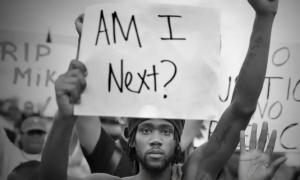Documental “13th” (Netflix): reseña del periódico The Guardian

Compartimos a continuación una reseña publicada por el diario británico The Guardian sobre el documental "13th", de Ava DuVernay (directora también de la película Selma (2014)). Éste aborda de forma crítica y bien fundamentada el origen racista y esclavista del sistema penitenciario de Estados Unidos, el cual, según concluye el trabajo, se encuentra en la base misma de la masificación carcelaria que ha vivido el país desde la década de 1970 hasta nuestros días. En efecto, se abordan las grietas y contradicciones de la política criminal estadounidense para desvelar cómo los sectores raciales más desventajados, en particular la comunidad afroamericana, han sufrido los embates estructurales desde la esclavitud legal hasta el trabajo ínfimamente remunerado en las prisiones. El vínculo corporativo privado con este esquema de exclusión de personas en la sociedad es decisivo para entender el porqué de las orientaciones políticocriminales que perpetúan un sistema de explotación peligrosamente legal. El documental es un aporte importante para entender nuestro sistema carcelario actual y a quiénes está realmente dirigido. Reproducimos la reseña del mismo a continuación.
Like most middle-class white liberals, I am concerned with the issue of racial inequality, but tend to assuage my feelings of anger, guilt and impotence with the sentiment that things are getting better. I mean, we have a two-term black president, right? Ava DuVernay’s documentary 13th is an articulate, no-nonsense cup of iced water splashed in my face telling me to wake the fuck up.
“Prisons are the new plantations!” may seem like sloganeering from a far-left protestor, but DuVernay’s effective film draws a strong, straight line from the abolition of slavery to today’s mass incarceration epidemic, explaining its root cause: money. Cheap prison labour is knotted up in the US economy in many unexpected ways, and the system is designed to get black men into jails early and often.
I can hear your conservative uncle interjecting already, but 13th – named for the constitutional amendment that abolished slavery but restricted rights of those deemed “criminals” – is remarkable in the way it takes its time to connect the dots and make its bold thesis. No, no one is saying we should free perpetrators of violent crime. But the numbers don’t lie: beginning in the 1970s with Richard Nixon’s campaign promise of “law and order”, prison populations exploded and continue to grow.
It wasn’t as if people suddenly decided to commit a greater number of low-level crimes; there was (and is) a concerted effort to entrap disenfranchised African-American communities with mandatory minimums, plea-bargaining arrangements, different sentences between crack and powder cocaine, programmes like three-strikes-and-you’re-out and stop-and-frisk. No one said “We once benefited from free black labour under slavery and we shall do so again with our prisons”, but 13th shows how institutions lurch forward thanks to apathy, inertia and the inability to fight back. Did you know that most prisoners aren’t allowed to vote once they are released? Or just how hard it is to find employment if you answer “yes” to the job interview question about previous convictions? I feel that if more people knew this they’d start to realise just how difficult it is to break cycles of imbalance.
The 13th makes its case with alacrity, clarity and a dash of pizazz. DuVernay mixes news footage, stats-laden graphics and a recurring visual highlight of the word “criminal” whenever someone uses it to make suppositions about black people. There are talking-head interviews with scholars and journalists, some better known than others, as well as politicians. These clips are shot in a straightforward manner, though I suspect DuVernay had a hard time not going the extra mile to make sure Angela Davis got special treatment. She’s interviewed in what looks like the interior of a derelict courthouse, wearing a billowy mustard-yellow scarf. A well-known older clip of her discussing violence is also included, to great effect.
The biggest and most welcome shock comes from Newt Gingrich, who is surprisingly forward-thinking, inasmuch as he suggests no white person could ever understand what it is like to be black in America. Bill and Hillary Clinton come under a degree of fire, as much of the mass incarceration initiated by Reagan grew during the 1990s. The Democrats’ current presidential candidate’s use of the term “super-predator” is analysed and, while she doesn’t come off as badly as some others, it’s hardly a good look.
One of DuVernay’s most effective sequences, however, is saved for Donald Trump, whose campaign speeches are juxtaposed with brutal clips from the civil rights era. Simpering remarks from his hate rallies about “the good old days” are set against classic images from Little Rock as well as violence towards minority protesters by his acolytes. These scenes make 13th one of the most effective horror movies in years. Lucky, then, that the film is being released on Netflix, as viewers may need to hit pause and find a bucket into which to vomit.
Not every talking point snaps together so nicely, though. A stretch explaining the curious corporate/lawmaker glad-handing club Alec (American Legislative Exchange Council), while certainly alarming, begins to stink a bit of dorm-room weed. I remain unconvinced that Walmart, evil on its own terms, really wanted George Zimmerman to gun down Trayvon Martin, even if its business model does capitalise on stand your ground laws.
A few small hiccups aside, 13th is very much not a Michael Moore film. It is organised, detailed and powerful. It is also bleak as hell, and, unfortunately, does not conclude with advice on what to do next. I think, though, the first step is obvious: clear one hour and 40 minutes of your time, turn off your damn phone, watch this movie, then tell others to do so. It’s a start.
Fuente original del escrito en la siguiente dirección: http://www.theguardian.com/film/2016/sep/29/the-13th-review-ava-duvernay-new-york-film-festival-prisons-plantations-race-law-us
El trailer del documental, el cual se puede ver por Netflix, es: http://https://youtube.com/watch?v=V66F3WU2CKk%2520frameborder%3D0%2520allowfullscreen

Comentarios Cerrados